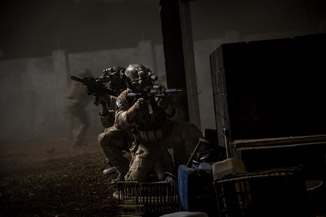Movie Review: Zero Dark Thirty
By Edwin Davies
December 19, 2012
Zero Dark Thirty begins with a moment that is shocking in its simplicity. Over a black screen, we hear the actual voices of those caught up in the horror of the September 11th attacks, beginning with the relatively calm words of people on the ground trying to figure out what was happening, gradually building to phone and black box recordings of the victims themselves. The voices overlap each other, growing more deafening until they form a wall of fear, death and incomprehension. It's a remarkably effective way of recreating the events of that day without feeling exploitative or crass, instead placing the audience at the whirling centre of the maelstrom.
The film then jumps forward to 2003, as Maya (Jessica Chastain), a CIA operative working as part of the team hunting for Osama bin Laden, arrives at a "black site," where she witnesses another operative (Jason Clarke) violently beat and torture a prisoner. It's an appropriately horrific initiation into a clandestine world of violence and subterfuge that consumes the next eight years of her life, as she slowly, obsessively and inexorably moves closer and closer towards her goal of finding and killing bin Laden.
Probably the first thing that needs to be said about Zero Dark Thirty - other than that it is excellent - is that it is a film that is neither pro- nor anti-torture. To suggest either would be to do a great disservice to the film by grossly misrepresenting it, and to obscure the key point about its depiction of American torture: the mere fact that it depicts American torture, and unambiguously, at all. There are no attempts to hide behind euphemisms or to soften the blows: It is pretty graphic in its depiction of so-called "enhanced interrogation" techniques, and it would take a truly heroic act of bold-faced lying for anyone to claim that the acts carried out do not qualify as torture.
It also stops short of condemning it, or showing anyone questioning its efficacy as a method of gathering information. There certainly aren't any characters who out and out endorse torture, either, but there are plenty who view it as a grim necessity in a fight against evil. This is not the view that the film itself seems to take - crucially, torture plays no part in finding bin Laden: it was actual information gathering like bribery, observation and detective work that eventually led to his death in May of last year - but it also does not avoid the uncomfortable truth that there were people who carried out horrendous acts because they were told to do so, and that some of them believed they were doing the right thing. It's an ambiguous take on a subject that is pretty much unequivocally awful, and as such could be considered cowardly on the part of director Kathryn Bigelow and writer Mark Boal. But more cowardly than not showing the torture? Absolutely not.
Continued:
1
2
|
|
|
|




